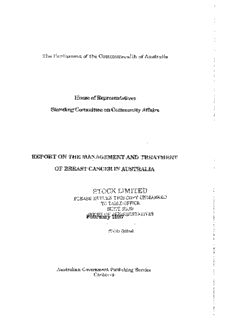Table Of ContentPLEASE RETURN THIS COPY UNMARKED
Australian Government Publishing Service
© Commonwealth of Australia 1995
1
Produced by the Australian Government Publishing Service
V
vi
vii Medical Oncology
viii Counselling ....
ix
x
xi
i
ii
iii
iv Decision
v Informal
vi Rural ar
vii Aboriginal and Torres
viii Women from a Non-English
ix Waiting Times for Sur
u
•i
7
viii Counselling
ix
V^ J
UdLhCL
iii Psycho-Social Needs
vi Rural and Remote Area Patients
vii Aboriginal and Torres Strait Islander Women
viii Women from a Non-English Speaking Background
ix Waiting Times for Surgery
xii Palliative Care
1 List of submissions
2 List of exhibits . . .
Selected patients' stories
IV
Graham Richardson referred an Inquiry into the Management and
Treatment of Breast Cancer to the House of Representatives Standing
Committee on Community Affairs. A sub-Committee with the following
Ms Maggie Deahm, MP Macquarie, NSW
Mr Harry Quick, MP Franklin, TAS
Mrs Silvia Smith, MP Bass, TAS
Ms Trish Worth, MP Adelaide, SA
Prior to the commencement of the Inquiry, discussions were held with
the Senate Standing Committee on Community Affairs. The Senate
Committee had already commenced an Inquiry into breast cancer
screening but was not addressing the question of overall management
It was considered appropriate and essential to extend the Senate's
consideration of the issue by examining the next stage of management
and treatment in this Inquiry.
cancer in Australia, witn specific
reference to:
patient access to treatment facilities;
treatment of breast cancer;
the role of the Department of Human Services and Health
in the management of breast cancer;
the role of cancer registries;
v
hospital system, the various specialist Colleges, Cancer Councils,
Mr Rod Atkinson, MP (to 23 February 1994)
eahm, MP
Svans, MP (from 2;
Mr Neville Newell, MP
Ms Jodie Williams
1 The Committee recommends, as a matter of urgency, that
members of the medical profession who deal with breast cancer, liaise
tinder the auspices of their respective Colleges, with a view to
are based on what is now generally considered to be a "best
and paramedical disciplines. Through their combined understanding of
current knowledge and practice about the best use of the options
available in individual circumstances, all members of the team liaise and
co-operate together and with the patient to diagnose, treat and manage
the condition of breast cancer to the highest possible standard of care.
fund, as a priority, multidisciplinary teams to treat women with breast
3 The Committee recommends that medical schools, as a matter of
urgency, examine their curricula with a view to initiating courses which
will enable their undergraduates to access information about the
diagnosis, management and treatment of cancer with particular
reference to breast cancer. Attention must be given to educating
undergraduates about the emotional and psycho-social context within
which patients must deal with their malignant disease, (para 3.8)
4 The Committee recommends that medical Colleges liaise with a
view to co-operating to provide their Fellows and Members with cross-
professional education and information on breast cancer, its diagnosis
and treatment, keeping in mind that such sharing is in the best
viu
co-operating with mammography programs, hospital management such
address the lack of exposure by general practitioners to training about
the management and treatment of cancer, and in particular of breast
cancer. That training should include: the need to encourage both self
examination of breasts and regular examination by the general
practitioner; the need to encourage appropriate patients to undergo
mammography screening; the role of multidisciplinary teams in the
diagnosis, management and treatment of breast cancer and appropriate
referral to such teams; and, aspects on the benefits to the patient and
their family of counselling and support groups, (para 3.14)
6 The Committee recommends that the Royal Australian College of
General Practitioners include as a compulsory core topic, training about
the management and treatment of breast cancer, (para 3.15)
7 The Committee recommends that the Royal Australian College of
Medical Administrators address the issue of hospital discharge practices
and how better communication links can be provided between the
hospital, the patient's general practitioner and community based care
8 The Committee recommends that, for the purposes of discharge
planning in public hospitals, general practitioners be eligible for a
Medicare rebate, (para 3.17)
9 The Committee recommends that The Royal Australasian College
of Surgeons give high priority to considering the role of the general
surgeon in the management and treatment of breast cancer, with a view
ix
performing breast cancer operations, (para 3.21
10 The Committee recommends that the Natioi
Research Council working party which is developing clinical practice
11 The Committee recommends that pathologists working on the
diagnosis of breast cancer be specially trained and have sufficient
experience in the area in which they are working, (para 3.27)
12 The Committee recommends that a pathologist be a member of all
and reskilling sessions in Departments of Radiation Oncology be
provided by the Colleges as a matter of urgency, (para 3.30)
14 The Committee recommends that greater exposure of medical
undergraduates to Radiation Oncology Departments be provided by the
medical schools as a matter of urgency, (para 3.31)
15 The Committee recommends that the Australian Technology
Advisory Committee address immediately the distribution of
radiotherapy units and the required number of radiation oncologists
and technical staff, (para 3.33)
Research Council working party which is developing clinical practice
guidelines on the treatment of diagnosed breast cancer, pay particular
attention to determining when radiotherapy for breast cancer should be
Description:Aiim. S Tucker, Geelong, VIC. Ms E Wellsmore, Carey Bay, NSW. ACT Cancer Society Inc., Breast Cancer Support Services. ACT Division of General Practice Inc. ACT Government, Deputy Chief Minister Ms Mollie Strong, Department of Health Contracting Nominee. Radiation Oncology Standing

